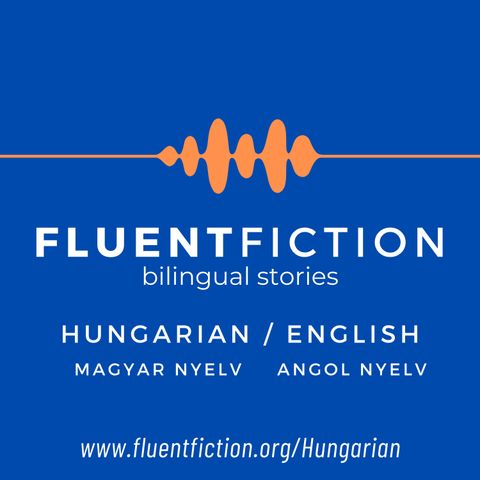The Unintentional Linguistic Comic: A Budapest Language Class Blooper

Scarica e ascolta ovunque
Scarica i tuoi episodi preferiti e goditi l'ascolto, ovunque tu sia! Iscriviti o accedi ora per ascoltare offline.
The Unintentional Linguistic Comic: A Budapest Language Class Blooper
Questa è una trascrizione generata automaticamente. Si prega di notare che non è garantita la completa accuratezza.
Capitoli
Descrizione
Fluent Fiction - Hungarian: The Unintentional Linguistic Comic: A Budapest Language Class Blooper Find the full episode transcript, vocabulary words, and more: https://www.fluentfiction.org/the-unintentional-linguistic-comic-a-budapest-language-class-blooper/ Story Transcript: Hu: Anna és László budapesti...
mostra di piùFind the full episode transcript, vocabulary words, and more:
fluentfiction.org/the-unintentional-linguistic-comic-a-budapest-language-class-blooper
Story Transcript:
Hu: Anna és László budapesti diákok.
En: Anna and László are students from Budapest.
Hu: Mindketten a Magyar Nyelv és Irodalom szakosok a főiskolán.
En: Both of them are majoring in Hungarian Language and Literature at the college.
Hu: Egy napon, amikor a magyar nyelvi órán ültek, valami váratlan történt.
En: One day, while they were sitting in a Hungarian language class, something unexpected happened.
Hu: Óra közepén, amikor a tanár felkérte őket, hogy beszéljenek a magyar nyelv sajátosságairól, László egyszer csak elkezdett furcsa szavakat használni.
En: In the middle of the class, when the teacher asked them to talk about the peculiarities of the Hungarian language, László suddenly started using strange words.
Hu: Nem tudta, mit mond, de valahogy a szavak egyszer csak kicsúsztak a száján.
En: He didn't know what he was saying, but somehow the words just slipped out of his mouth.
Hu: Anna ránézett, majd hangosan felnevetett.
En: Anna looked at him and burst out laughing.
Hu: Ez volt az első alkalom, hogy Lászlót zavarban látták.
En: It was the first time they had seen László embarrassed.
Hu: Normális esetben mindig magabiztos volt.
En: Normally, he was always confident.
Hu: De valami eltérítette őt.
En: But something had thrown him off.
Hu: Elnevette magát.
En: He laughed at himself.
Hu: Olyan szavakat használt, mint "szerpentin", "főnix" és "hiperbolikus", amelyek nagyon viccesen hangzottak a magyar nyelvi környezetben.
En: He used words like "serpentine," "phoenix," and "hyperbolic," which sounded very funny in the Hungarian language setting.
Hu: A tanár kezdetben meglepődött, de később maga is elnevette magát.
En: The teacher was initially surprised, but later she too laughed.
Hu: Azt mondta, hogy ez az első alkalom, hogy ilyen szavakat hall a magyar nyelvi órán.
En: She said that this was the first time she had heard such words in a Hungarian language class.
Hu: Az osztályban mindenki szívélyes hangulatban volt, mivel ez a helyzet a nap teljesen váratlan humorforrásává vált.
En: The whole class was in a warm mood, as this situation had turned into a completely unexpected source of humor for the day.
Hu: Az esetről beszámoltak a főiskola újságjában is.
En: The incident was also reported in the college newspaper.
Hu: Még a helyi televízió is interjút készített Lászlóval.
En: Even the local television interviewed László.
Hu: Megkérdezték, hogyan jutottak eszébe ezek a szavak.
En: They asked him how he came up with these words.
Hu: Ő csak azt mondta, hogy fogalma sincs.
En: He simply said he had no idea.
Hu: Így történt, hogy László, aki általában csendben és visszafogottan viselkedett, hirtelen a középpontba került.
En: So it happened that László, who usually behaved quietly and reservedly, suddenly became the center of attention.
Hu: Vicces szavai híressé tették őt a főiskolán, és még a városban is ismertté váltak.
En: His funny words made him famous at the college, and even in the city he became known.
Hu: De ami a legfontosabb, hogy László képes volt nevetni magán.
En: But most importantly, László was able to laugh at himself.
Hu: Megtanulta, hogy minden helyzetben derűsnek kell lenni.
En: He learned to be cheerful in every situation.
Hu: Anna pedig megerősítette, hogy a hosszú ideje tartó barátság bizonyára csodálatos.
En: Anna reaffirmed that their long-lasting friendship was truly wonderful.
Hu: Ettől a naptól kezdve, amikor László érezte, hogy az élet nehéz, csak eszébe jutott, milyen vicces szavakat mondott a magyar nyelvi órán.
En: From that day on, whenever László felt that life was tough, he just remembered the funny words he said in the Hungarian language class.
Hu: És mindig eszébe jutott Anna nevetése.
En: And he always remembered Anna's laughter.
Hu: Ez mindig megnevettette őt is, és ez segített neki átvészelni a nehéz időket.
En: It always made him laugh too, and this helped him get through tough times.
Hu: Így Anna és László emlékezett arra a vicces napra Budapesten, amikor László elszólta magát a magyar nyelvórán.
En: So Anna and László remembered that funny day in Budapest when László slipped up in the Hungarian language class.
Vocabulary Words:
- students: diákok
- Budapest: Budapest
- Hungarian: magyar
- Language: nyelv
- Literature: irodalom
- college: főiskola
- class: óra
- unexpected: váratlan
- peculiarities: sajátosságok
- strange: furcsa
- teacher: tanár
- words: szavak
- laughing: felnevetett
- embarrassed: zavarban
- confident: magabiztos
- threw off: eltérítette
- reported: beszámoltak
- newspaper: újság
- interviewed: interjút készített
- center of attention: középpontba került
- cheerful: derűs
- friendship: barátság
- wonderful: csodálatos
- tough: nehéz
- remembered: emlékezett
- slipped up: elszólta magát
Informazioni
| Autore | FluentFiction.org |
| Organizzazione | Kameron Kilchrist |
| Sito | www.fluentfiction.org |
| Tag |
Copyright 2024 - Spreaker Inc. an iHeartMedia Company

Commenti